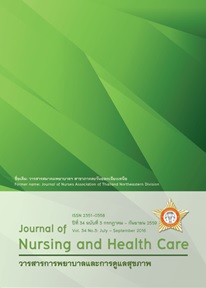ผลของโปรแกรมสร้างเสริมสมรรถนะแห่งตนต่อพฤติกรรมการบริโภคอาหารของ ผู้ป่วยเบาหวานที่ไม่สามารถควบคุมระดับนํ้าตาลในเลือด Effects of Self- Efficacy Enhancement Program on Food Consumption Behaviors among Patients with Uncontrolled Diabetes Mellitus
คำสำคัญ:
โปรแกรมสรา้ งเสริมสมรรถนะแหง่ ตน พฤติกรรมการบริโภคอาหาร ผูป้ ว่ ยเบาหวานที่ไมส่ ามารถควบคุมระดับ นํ้าตาลในเลือด self –efficacy program, food consumption behaviors, uncontrolled diabetes mellitusบทคัดย่อ
บทคัดย่อ
การวิจัยครั้งนี้เป็นการวิจัยกึ่งทดลอง มีวัตถุประสงค์เพื่อศึกษาผลของโปรแกรมสร้างเสริมสมรรถนะแห่งตนต่อพฤติกรรม
การบริโภคอาหารของผูป้ ว่ ยเบาหวานที่ไมส่ ามารถควบคุมระดับน้ำตาลในเลือด กลุม่ ตัวอยา่ งเปน็ ผูป้ ว่ ยเบาหวานที่ไมส่ ามารถควบคุมระดับนํ้าตาลในเลือด จำนวน 26 คน ที่อาศัยอยู่ในหมู่บ้านวังหว้า หมู่ 8 และ หมู่ 11 ตำบลบ้านแฮด อำเภอบ้านแฮดจังหวัดขอนแกน่ คัดเลือกกลุม่ ตัวอยา่ งแบบเฉพาะเจาะจงเขา้ กลุม่ ตามโปรแกรมสรา้ งเสริมสมรรถนะแหง่ ตน เครื่องมือดำเนินการวิจัยประกอบด้วย แบบสัมภาษณ์การรับรู้สมรรถนะแห่งตนในพฤติกรรมการบริโภคอาหาร แบบสัมภาษณ์พฤติกรรมการบริโภคอาหารของผู้ป่วยเบาหวาน และโปรแกรมการส่งเสริมสมรรถนะแห่งตน วิเคราะห์ข้อมูลด้วย Paired t-test ผลการวิจัย พบวา่ คะแนนการรับรูส้ มรรถนะแหง่ ตนเรื่องการบริโภคอาหารของผูป้ ว่ ยเบาหวานหลังไดรั้บโปรแกรมการส่งเสริมสมรรถนะแห่งตนสูงกว่าก่อนได้รับโปรแกรมอย่างมีนัยสำคัญทางสถิติ (p < 0.001) คะแนนพฤติกรรมการบริโภคอาหารของผูป้ ว่ ยเบาหวานหลังไดรั้บโปรแกรมสูงกวา่ กอ่ นไดรั้บโปรแกรมอยา่ งมีนัยสำคัญทางสถิติ (p < 0.001) ผลการวิจัยครั้งนี้สามารถนำไปใช้เป็นแนวทางเพื่อส่งเสริมพฤติกรรมการบริโภคอาหารในผู้ป่วยเบาหวานสำหรับบุคลากรทางด้านสาธารณสุขหรือผู้มีส่วนเกี่ยวข้องต่อไป
Abstract
This quasi - experimental study was to investigate the effects of a self-efficacy enhancement program on food consumption behaviors among patients with uncontrolled diabetes mellitus. The study sample consisted of 26 patients with uncontrolled diabetes mellitus who lived in Ban Wang Wa Village, Tambon Banhad, Banhad District, Khon Kaen Province, Thailand. Purposive sampling was used for subject selection. Research instrument consisted of perceived a self - efficacy on food consumption questionnaire, a food
consumption behaviors questionnaire and the self - efficacy program. Data analyed by paired t-test Results showed that self - efficacy on food consumption score after receiving the self - efficacy program increased significantly from the score before program implementation (p <0.001). Food consumption behavior score after receiving the self - efficacy program improved significantly compared to the score prior to program
implementation as well (p <0.001). The results of this study could be used as a guideline for health care providers to enhance food consumption behavior in among individuals with diabetes mellitus.



